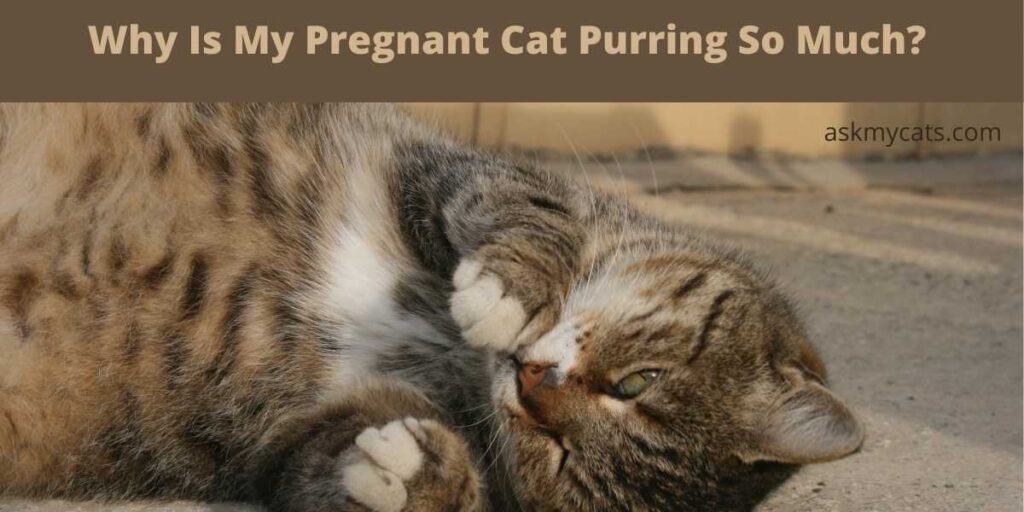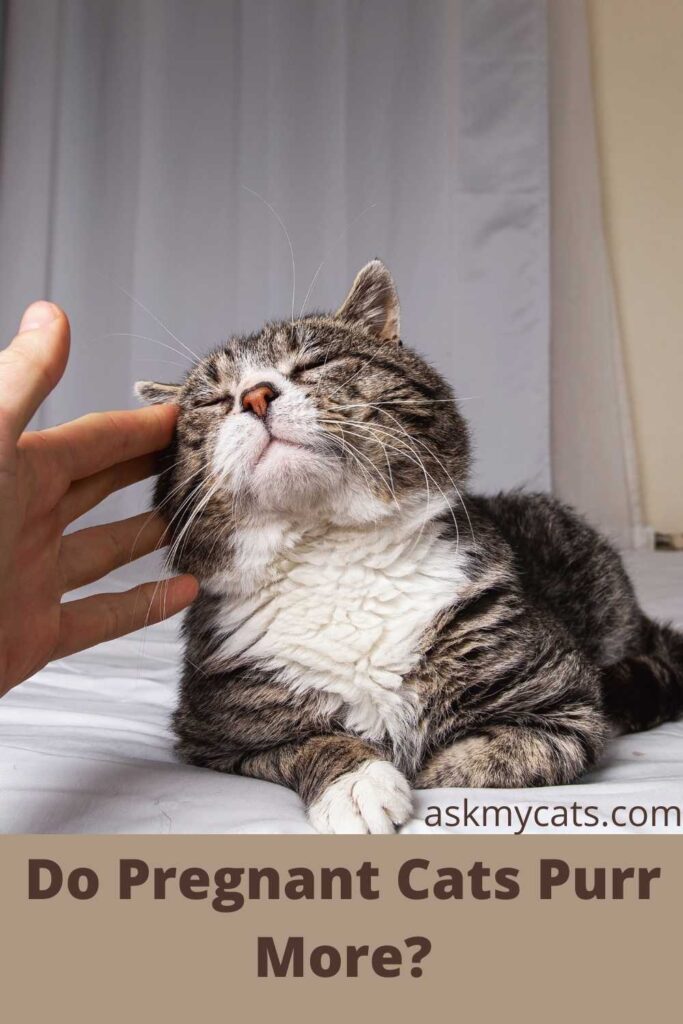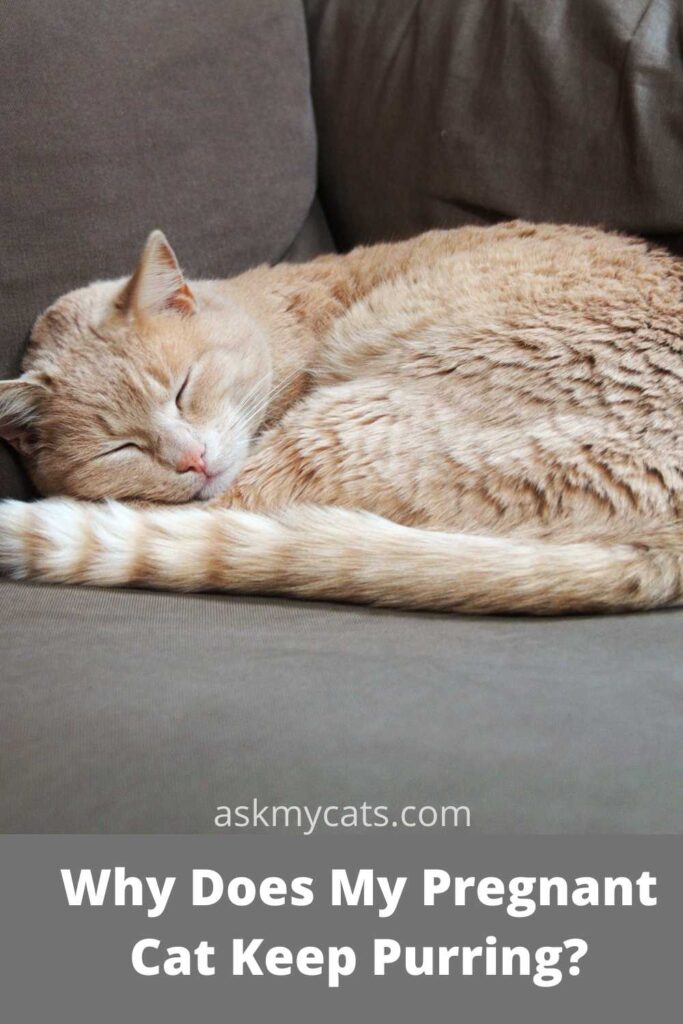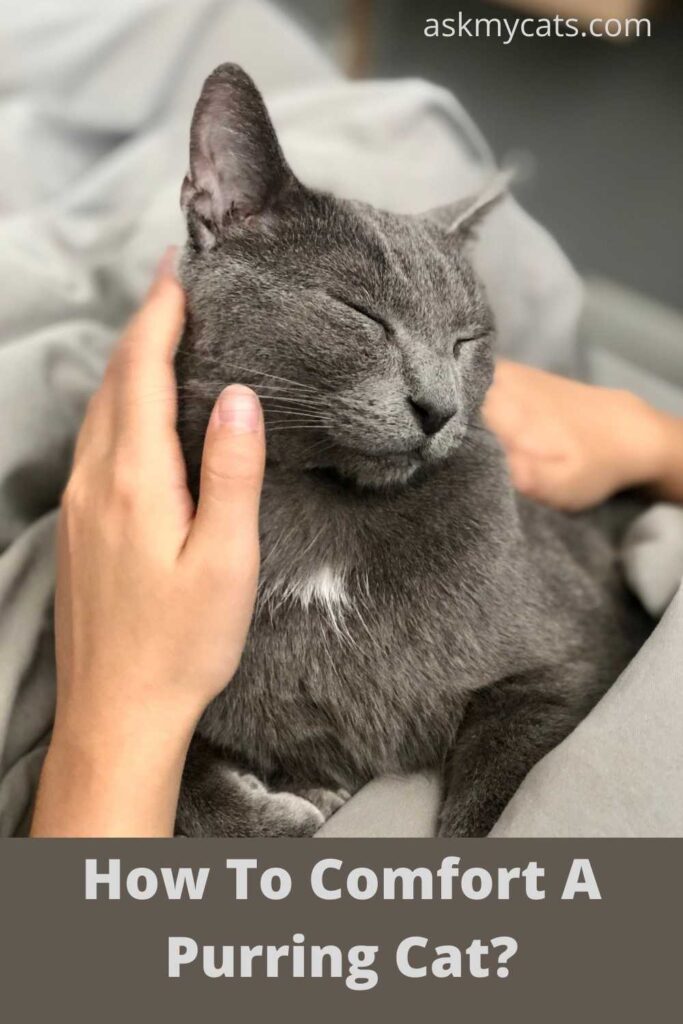Do you have a pregnant cat in your house? Are you wondering why it purrs so much?
You feel like comforting your “purrfect baby,” but you’re confused about how.
As a mother of 2 of my 3 nursing cats, I’ll tell you how.
There’s nothing to worry about. Purring in pregnant cats is a normal tendency. You don’t have to break a sweat thinking about it.
Let’s see why pregnant cats purr, especially before giving birth.
Key Takeaways
- Pregnant cats may purr more frequently due to hormonal changes and increased need for comfort and affection.
- This behavior is normal and is a way for the cat to ask for love and care from its owner.
- It is important to provide additional care and support for a pregnant cat, including a comfortable and safe place for her to give birth.


Give Your Cat the Perfect Day
Get the Free Ebook!
Do Pregnant Cats Purr More?

Your pregnant cat may exhibit more maternal behavior, such as more purring and a greater desire for attention from you. If you see this, give her more snuggles!
Cats go through a tough time during pregnancy, and they also experience mood changes. For them, the changes are more about feeling incredibly affectionate rather than depressed.
In the 7th week of her pregnancy,
Your cat might begin nesting right now in search of a cozy, secure location to give birth to her kittens.
She will probably choose to give birth in a warm, quiet place with lots of blankets, so you can provide such things for her.
She may be purring more frequently and focusing on you more. Give her a fuss when she requests it because she’s just feeling a little needy. Let her know you care through your actions.
She will only let you assist her at this time. Once she begins her labor, she finishes the pregnancy by giving birth to her kittens, all by herself.
Must Read: Why Is My Cat Meowing/Purring After Giving Birth?
Do Cats Purr A Lot Before Giving Birth?
Yes, cats purr excessively before going into labor. Although it might seem concerning, it is one of their instinctive ways of asking for love and care from you.
Depending on the number of kittens she is going to have, your cat will gradually gain between one and two kg. That she is pregnant is clear from this.
She will start to act agitated, refuse meals, and start looking for a peaceful location to give birth.
The mother’s body temperature drops to about 37.8 °C as the earliest indication of labor.
Your cat’s behavior will change to a “maternal” one just before giving birth, and she will start purring a lot.
Why Does My Pregnant Cat Keep Purring?

As a means of self during the early stages of labor, the queen will purr and interact with you more than usual.
Here are some of the ways to identify if your cat is pregnant:
1. Heat Cycle
You are probably already aware of a female cat’s heat cycles if she hasn’t been spayed.
In order to attract male cats for mating, a queen in heat would often become more loving, make agonizing noises, roll around on the floor, and appear to be hunting for something.
Heat cycles can last up to a week and usually occur every 10 to 14 days. She might be pregnant if you’ve just noticed that it hasn’t happened in a while.
2. Nipples
In terms of pregnancy, cats and humans are identical. Like in the human body, a cat’s body must become ready for pregnancy.
This implies that if your cat is pregnant, her nipples will look different. They’ll probably turn pinkish in color and appear larger and puffier.
If you have a cat with light-colored fur, you can probably see this very easily.
3. Hungry Again!
Another symptom that could be simple to notice is this one- Your c ats’ appetite will increase during pregnancy.
Cats are typically used to eating whatever quantity is provided to them regularly. She will, however, begin to experience hunger more frequently during her pregnancy.
Why? Like human mothers, cat mothers must take care of both themselves and the young that are developing inside of them. She has a legitimate need for food because, unlike humans, cats give birth to between 4 and 6 kittens at once.
She will get less hungry as she approaches to labor.
4. Puking
It’s highly likely that your female cat is pregnant if she starts throwing up fairly frequently. Make sure she’s fine otherwise.
You should be mindful if your cat becomes physically ill. If it occurs frequently, it may be a sign that something is wrong and a trip to the veterinarian is required.
5. Nesting
A cat will start nesting in the later stages of pregnancy, which basically means that she will start looking for a calm, secure location to give birth to her kittens.
Start storing big, fluffy towels in cardboard boxes in prime spots throughout your home that are easy for them to access. Cover any risky corners that your cat might attempt to enter.
Must Read: Cat Purring Effect On Humans: The Power of Cat Purring
How To Comfort A Purring Cat?

1. Confirm Her Pregnancy
You may want to confirm that your cat is pregnant. Purring is a common phenomenon among pregnant cats. If your cat is spayed or not pregnant yet and is still purring, then the reason might be different.
If she is pregnant, then her purring is a method of communicating with you. Mother cats become much more vocal during this time and demand attention and focus from you.
2. Routine Care
It can be dangerous to cuddle your pregnant cat, despite how tempting it is.
If you happen to squeeze or press on the cat’s stomach in any way, it could make the cat uncomfortable and could result in a miscarriage.
And clean her litter box at least once a day, every two days, if you aren’t already.
Replace her current litter box with one that is lower to the ground and has a wider opening if it cannot support her weight during pregnancy.
3. Ensure Proper Nutrition
You must ensure that your cat is receiving the right nutrients for both her personal health and the development of the young she is carrying.
By the beginning of the sixth week, you ought to be providing at least 25% extra food. The mother’s ability to milk and the kittens’ ability to grow requires a diet rich in protein and calcium.
Interesting Read: Why Does My Cat Lay On Me And Purr?
4. Ensure Proper Health
It’s crucial to make sure your cat is healthy enough to withstand the demands of pregnancy and give birth, even though a healthy cat will rarely experience issues brought on by pregnancy.
Make sure your cat’s common vaccinations are updated and have it examined for routine parasites. If your pregnant cat starts to lose interest in eating, be on the lookout.
It may be a sign of a problem if your cat is acting upset and licking her vulva. Keep an eye out for any unusual or unpleasant vaginal discharge.
A uterine infection may be indicated by the presence of blood in your cat’s pee or by the fact that they are squatting without producing any urine.
5. Proper Nesting Environment
For your cat to give birth in a secure, homely environment is ideal. Most mother cats will look for their own nesting space in the final week or two of pregnancy as they get ready to give birth.
If you decide to assist her, be prepared for the fact that she will need soft bedding, a location with little human activity, and seclusion from other pets in the house. Make sure that everyone in the house respects her limits and privacy as well.
Interesting Read: Why Does My Cat Purr And Bite Me?
Some of the Interesting reads regarding cat purring:
- Why Do Cats Purr? The Science of Cat Purring
- Why Doesn’t My Cat Purr?
- How To Make A Cat Purr?
- Why Do Cats Purr When You Talk To Them?
- Why Do Cats Purr When They Are Dying?
- Do Cats Purr When They Sleep?
- Why Does My Cat Purr When He Sees Me?
- Why Is My Cat Purring So Much?
- Why Does My Cat Purr So Loudly?
- Differences In Purring Between Cat Breeds
- Why Do Cats Purr When You Stroke Them?
- Can Cats Control Their Purring?
- Do Cats Purr When They Are Happy?
- Do Cats Breathe Faster When Purring?
- Why Does My Cat’s Purring Sound Congested?
- Why Do Cats Wag Their Tails While Purring?
- How To Purr Like A Cat?
- Why Do Cat’s Noses Get Wet When They Purr?
- Why Do Cats Purr And Knead?
- Do Cats Purr When They Are Sick Or In Pain?
- Do Feral Cats Purr?
Frequently Asked Questions
Is it normal for pregnant cats to purr?
It is normal for a cat to search for a secure area to give birth to her kittens before she gives birth. It appears that she is attempting to inform you that she has determined that the location should be inside your residence.
Her purring signifies that she seeks intimacy from you as a dependent.
She is quite vulnerable and going through a difficult moment. She is in need of a few hugs and cuddles right now.
Nothing to be concerned about. Offer her what she requests. Your baby needs you now more than ever!
Do pregnant cats like their bellies touched?
Every cat experiences it differently. While some cats enjoy receiving belly rubs, others despise them.
Pro tip: Never pick up a pregnant cat by the tummy while carrying her up; always scoop her up from the ground. That not only makes her uncomfortable but also harms her. The kittens she is carrying are in danger of dying.
Don’t tap on her stomach either. She will come up to you if she wants to cuddle. Leave her alone until then.
Final Word
You become worrisome as the days go by. You start to doubt your legitimacy as a cat parent at every turn.
We understand that, but we nonetheless want you to maintain your composure. Your cat will become much more stressed if she sees you worried right now. Don’t put it at risk for her.
Using this article as a guide, you can avoid all the common misunderstandings about pregnant cats’ purring.
Tell us in the comments if your cat enjoys cuddles or loathes them.
How did you handle your cat’s pregnancy?
Interesting Read: Why Does My Cat Drool When He Purrs?
